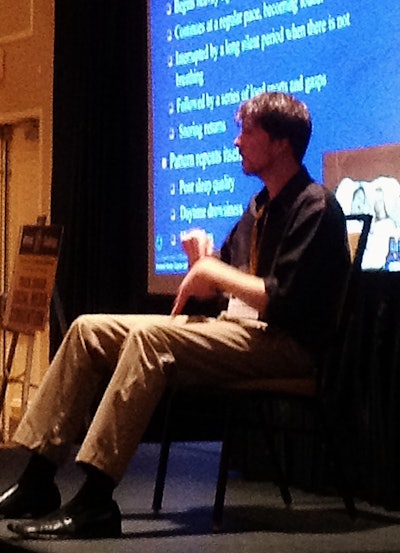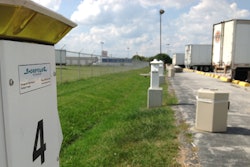 Sign interpreter at the Truck Driver Social Media Convention rendered Elaine Papp’s talk to Deaf Truckers United members on hand.
Sign interpreter at the Truck Driver Social Media Convention rendered Elaine Papp’s talk to Deaf Truckers United members on hand.Speaking at the Truck Driver Social Media Convention in Kansas City, Mo., Oct. 27, Federal Motor Carrier Safety Administration Medical Programs Chief Elaine Papp detailed work the agency has put in to develop programs for variances to medical requirements for certain interstate drivers. When fully developed, she said, programs for both deaf drivers and drivers suffering from seizure disorder would proceed in a manner similar to the routine programs for some diabetes and those with vision capabilities that don’t meet the standard requirements.
“We’re in the process of working on a program for seizure disorder and for deaf drivers,” Papp said. “We have [45] deaf drivers who’ve applied for an exemption through the National Association for the Deaf or on their own. We’ve published their names for 30-day public comment [which ended in June].”
After comments are reviewed, Papp added, the hope is that “this will start to become a routine exemption — and the same thing for seizures. We have about 29 people who we have been processing for” seizure exemption, which program is not as far along. “We haven’t published information for comment,” she said.
The news was delivered to an audience that included almost 20 members of Deaf Truckers United, a group of hearing-impaired drivers who advocate on behalf of the deaf in the trucking industry.
Papp added that the agency was also in the process of developing a way to routinely review the inspection and crash histories of drivers under the various exemption programs to help ensure they are operating safely. Today, “with diabetes and vision, we typically don’t get comments” upon publication of names up for exemptions in the Federal Register, she added.
The National Association for the Deaf initially petitioned the FMCSA for consideration of an exemption for 29 drivers in July of 2011, prompting FMCSA’s further action on the issue of medical certification for hearing-impaired drivers as well as an influx of further applications that ultimately numbered 45. Following the consideration of those 45 drivers, Papp noted, the NAD “said they had another 80 drivers who would apply for an exemption,” ultimately. In concurrence with NAD, the Deaf Truckers United group believes the current hearing requirements in the CDL medical certification guidelines pose an unnecessary burden on the hearing impaired.










